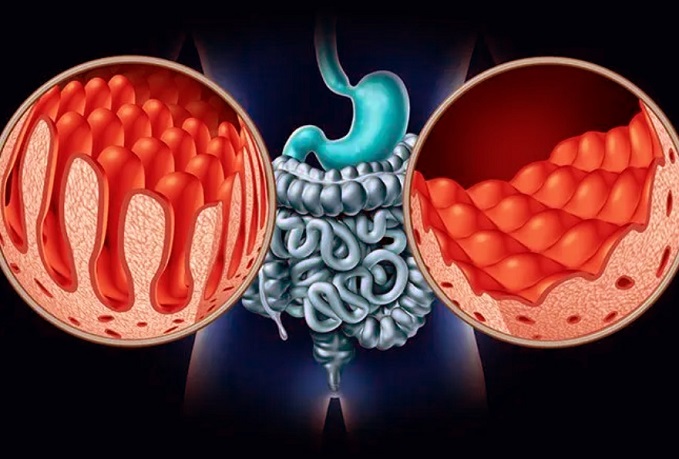COVID-19 Destroys the Nutrient Absorption Capabilities of the Gastrointestinal Tract!
Nikhil Prasad Fact checked by:Thailand Medical News Team Jun 25, 2025 8 months, 1 week, 24 minutes ago
Thailand Medical News: Many Post-COVID-19 Individuals Are Suffering From Serious Nutrient Malabsorption Issues Without Even Knowing!
As the world continues to grapple with the lingering effects of the COVID-19 pandemic, emerging research has revealed yet another alarming aspect of the SARS-CoV-2 virus—its ability to severely impair nutrient absorption in the gastrointestinal (GI) tract. While respiratory symptoms have been the primary focus since the outbreak began, it has become increasingly clear that the virus does not confine its damage to the lungs. Instead, it can target the entire digestive system, leading to both short- and long-term disruption of intestinal function.
 COVID-19 Destroys the Nutrient Absorption Capabilities of the Gastrointestinal Tract
COVID-19 Destroys the Nutrient Absorption Capabilities of the Gastrointestinal Tract
Recent studies confirm that SARS-CoV-2 infects enterocytes, the cells lining the small intestine, via the angiotensin-converting enzyme 2 (ACE2) receptor. These cells are crucial for absorbing nutrients from digested food. Once infected, enterocytes undergo inflammation, apoptosis (cell death), and loss of villi structure—critical finger-like projections that increase surface area for absorption. As a result, this
Thailand Medical News report highlights a growing concern in the medical community: COVID-19 is not just a respiratory disease, but a systemic illness capable of inducing intestinal malabsorption.
Mechanisms Behind Nutrient Malabsorption in COVID-19 Patients
SARS-CoV-2’s interaction with the ACE2 receptor is central to the gut damage observed. The ACE2 receptor is abundantly expressed not just in the lungs but also in the epithelial cells of the small intestine. Past studies have already demonstrated that the SARS-CoV-2 virus can directly infect human gut organoids, causing structural damage and triggering inflammatory responses. This infection leads to disruption of the intestinal barrier, loss of tight junction integrity, and infiltration of immune cells—all contributing to a compromised absorptive function.
Moreover, COVID-19-induced inflammation often results in an imbalance of the gut microbiota (dysbiosis), which further contributes to malabsorption. Beneficial microbes that assist in digestion and nutrient synthesis are depleted, while opportunistic pathogens flourish. This altered gut ecosystem, coupled with direct cellular damage, severely affects the assimilation of vitamins (particularly B12, D, and folate), amino acids, and essential trace elements such as zinc and selenium. Deficiencies in these nutrients can exacerbate fatigue, cognitive dysfunction, and immune impairment—symptoms commonly reported in long COVID patients.
Clinical Evidence and Real-World Implications
Researchers have observed significant gastrointestinal symptoms in COVID-19 patients, including diarrhea, nausea, and abdominal pain, which were often associated with evidence of intestinal inflammation and malabsorption.
Importantly, the symptoms persisted long after the acute infection had resolved
, suggesting chronic disruption of gut function.
Studies have also validated that hospitalized COVID-19 patients had lower serum levels of essential nutrients, particularly in those with prolonged GI symptoms. Stool samples revealed increased intestinal permeability and markers of epithelial cell damage, indicating a leaky gut—a condition that impairs nutrient absorption and contributes to systemic inflammation.
Even after recovery from the acute phase, many patients continue to experience signs of intestinal dysfunction. These include bloating, unintentional weight loss, and intolerance to certain foods, pointing toward lingering malabsorption and possible post-infectious irritable bowel syndrome (IBS). In children, this can be especially concerning, as nutrient deficiencies can impact growth and cognitive development.
Consequences for Long COVID and Nutritional Health
The implications of compromised nutrient absorption are far-reaching. In long COVID patients, malabsorption may contribute to chronic fatigue, poor wound healing, hair loss, hormonal imbalances, and neurological symptoms. Deficiencies in vitamin D and magnesium, for instance, are now being linked to exacerbated immune dysfunction and pro-inflammatory cytokine release.
Furthermore, impaired nutrient absorption undermines the body's ability to mount an effective immune response, increasing susceptibility to other infections and delaying full recovery. In older adults or individuals with pre-existing nutritional deficiencies, the risk of complications becomes even more pronounced.
Conclusion
The idea that COVID-19 primarily targets the lungs is now outdated. Mounting scientific evidence shows that the virus can infiltrate the gastrointestinal tract, damage the intestinal lining, alter gut microbiota, and significantly impair the body’s ability to absorb nutrients. These disruptions may persist long after the virus has been cleared from the respiratory system, contributing to the debilitating symptoms seen in long COVID cases. Addressing nutrient deficiencies and restoring gut health must become a cornerstone of post-COVID recovery strategies. Clinicians should remain vigilant in monitoring nutritional status in patients with persistent GI symptoms and offer targeted supplementation or even nutritional IV drips where necessary. Ultimately, the gastrointestinal impact of COVID-19 is not a side note but a central piece of the pandemic’s long-term health burden.
References:
https://aspenjournals.onlinelibrary.wiley.com/doi/10.1002/ncp.10554
https://www.sciencedirect.com/science/article/pii/S1756464624005644
https://www.xiahepublishing.com/2472-0712/ERHM-2020-00055
https://www.frontiersin.org/journals/microbiology/articles/10.3389/fmicb.2024.1500890/full
https://www.frontiersin.org/journals/microbiology/articles/10.3389/fmicb.2022.860931/full
https://www.sciencedirect.com/science/article/pii/S1933021924000291
https://www.medrxiv.org/content/10.1101/2020.03.23.20040279v1.full
https://www.mdpi.com/1999-4915/16/3/370
https://www.wjgnet.com/1007-9327/full/v29/i15/2283.htm
https://journals.lww.com/jcma/fulltext/2020/09000/how_is_the_digestive_system_affected_by.1.aspx
https://www.cghjournal.org/article/S1542-3565(22)01004-7/fulltext
https://www.science.org/doi/10.1126/sciimmunol.abc3582
https://www.nature.com/articles/s41586-020-2196-x
https://karger.com/ddi/article-abstract/40/4/506/827901/Gastrointestinal-Disease-and-COVID-19-A-Review-of
https://jamanetwork.com/journals/jama/fullarticle/2768391#google_vignette
For the latest COVID-19 News, keep on logging to
Thailand Medical News.
Read Also:
https://www.thailandmedical.news/news/yet-another-study-validates-that-sars-cov-2-triggers-hidden-stomach-damage
https://www.thailandmedical.news/news/covid-19-spike-protein-triggers-dangerous-arginine-imbalance-in-blood-vessels
https://www.thailandmedical.news/news/covid-19-infection-triggers-unseen-brain-chemistry-reboot-that-could-explain-strange-neurological-symptoms
https://www.thailandmedical.news/articles/coronavirus
